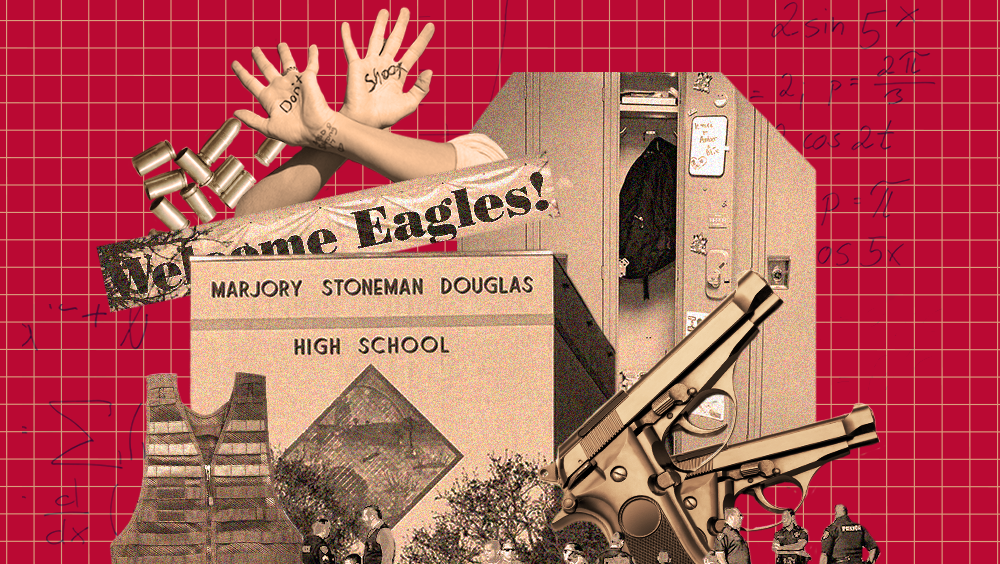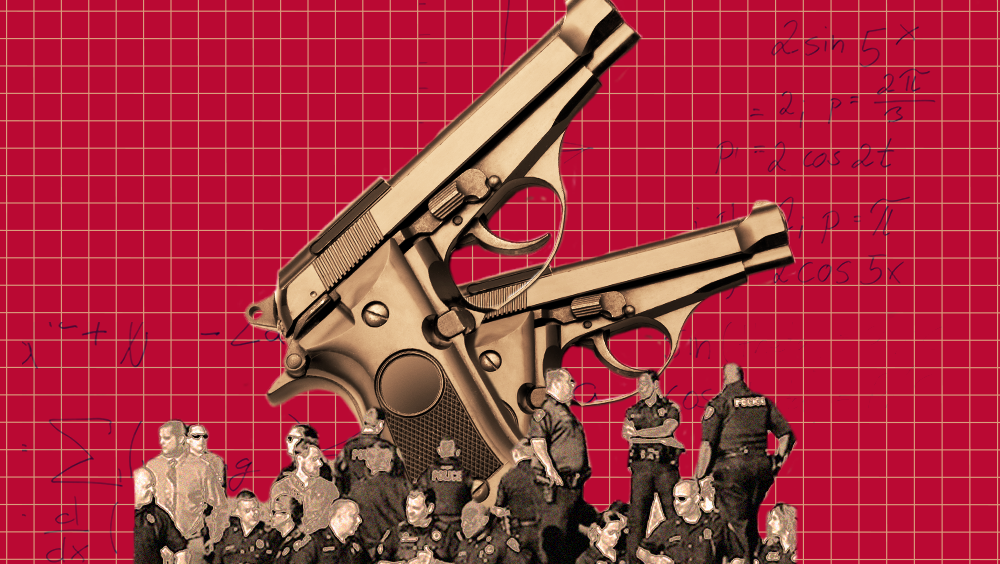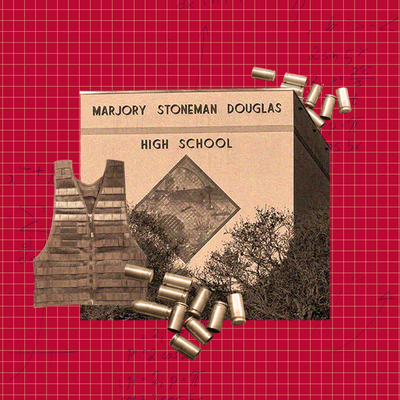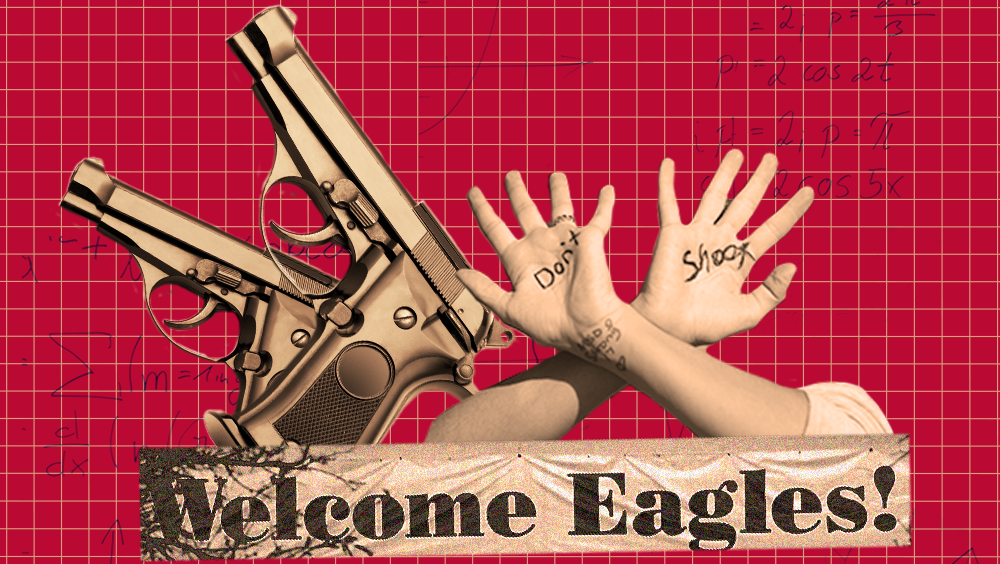8 Parkland Teachers on What They Really Think About Being Armed
The MSD Safety Commission is pushing for it, but are these teachers ready to—quite literally—have their students’ lives in their hands?


Eight days after the Marjory Stoneman Douglas High School shooting that left 17 dead, President Donald Trump suggested America's gun violence epidemic could be solved with an incentive-based solution: arming teachers. Eleven months later, the Marjory Stoneman Douglas High School Public Safety Commission—composed of 15 members, a mix of law enforcement, victims' parents, school board members, and legislators—presented to state officials its 480-page final report outlining the inefficiencies of the events that unfolded on the tragic day (a disarrayed Broward County Sheriff's Office, a life-altering delay in calling a Code Red, and an armed school resource officer refusing to enter the building, amongst other preventable mistakes). One of its proposed solutions: arming teachers.
The weeks leading up to the one-year anniversary of the Parkland shooting have left students, teachers, faculty, and the rest of the Coral Springs/Parkland, Florida community filled with sadness and grief. So much has been accomplished in the past 12 months in the fight for common-sense gun reform, as the Parkland student activists have shown us, but arming teachers in classrooms remains at the forefront of a controversial, uncomfortable debate on how to keep American children safe. That is, when the focus is solely on reducing gun deaths in schools—not churches, not synagogues, not concerts, not movie theaters.
Parkland parent Fred Guttenberg, who lost his 14-year-old daughter Jaime and has been fighting to end gun violence ever since, is strongly against teachers carrying weapons in their classrooms. Change the Ref founders Patricia and Manuel Oliver, mother and father of 17-year-old victim Joaquin Oliver, also oppose this. On the other hand, Andrew Pollack, whose 18-year-old daughter Meadow was killed, believes if teachers were armed on February 14, 2018, his child might still be alive today. Max Schachter, the father of 14-year-old Alex Schachter, who was also killed, was the only member of the MSD Commission to vote against arming teachers. Instead, he suggested arming non-teaching staff and hiring more police officers.
If teachers are able to volunteer to go through a "thoroughly screened and extensive training to carry concealed firearms on campuses for self protection," as the MSD Commission suggests in its report, there are many factors to consider, including the comfort of their own students. However, it will ultimately be up to the educators—if Florida's Guardian Program is expanded—to decide whether or not they want their students' lives literally in their hands.
MarieClaire.com asked eight MSD teachers what they think about the Commission's proposal to arm them—and whether or not the increase of guns on campuses could prevent the next community from experiencing the pain Parkland has endured the past year.
Arm me with money for classroom supplies. Arm me with adequate technology.

“I think arming teachers might just be the dumbest thing I’ve ever heard. I went to college to study English and become a teacher. I’m not a security guard. I’m not a police officer. We went about eight years in Broward County without getting a raise. Suddenly, money will be found to train and arm teachers? Arm me with money for classroom supplies. Arm me with adequate technology. Arm me with more money in my paycheck. Arm me with people in Tallahassee and D.C. who can determine logical educational policies. Arm me with a supportive school board. Don’t arm me with a weapon. About two days after the events at MSD, I was on CNN opposite a sheriff from Ohio. He suggested that teachers be armed. I told him that a gun wouldn’t have helped me that day. It would’ve been locked in my closet. Had the shooter entered my room, by the time I would’ve accessed my gun, I would’ve been shot and killed. He agreed with me.”
—Sarah Lerner, teaches English and Journalism
It would create far more problems than it would potentially solve.
“Though I applaud the Commission's efforts to improve school safety, I believe that this particular component is unwise. In my estimation it would create far more problems than it would potentially solve. My own son will be at MSDHS next school year, and I honestly wouldn't be comfortable with his teachers (my friends and colleagues) packing guns in their classrooms.”
—Kyle Jeter, teaches Astronomy
Get exclusive access to fashion and beauty trends, hot-off-the-press celebrity news, and more.
Instances of racial bias and innocent Black lives being taken by gun-carrying law enforcement officers continues to be an issue that needs to be resolved in our country.
“Recently, the Stoneman Douglas High Public Safety Commission poured salt on our wounds by recommending that the answer to gun violence in our schools is allowing teachers to carry guns in their classrooms. The allure of special certification is most certainly a mirage. We already know that experienced administrators and trained law enforcement officers did not correctly respond on that tragic day in which our community lost 17 precious lives and 17 more were wounded.
Tasking overworked and underpaid teachers with the added responsibility of protecting their students from attackers with high-powered assault weapons will not prevent future school shootings.
Students of color have openly argued that more guns will certainly not make them feel safe on campus. The instances of racial bias and innocent Black lives taken by gun-carrying law enforcement officers continues to be an issue that needs to be resolved in our country. Tasking overworked and underpaid teachers with the added responsibility of protecting their students from attackers with high-powered assault weapons will not prevent future school shootings. We need to continue to work together to convince the politicians in power that increased mental health funding, common-sense gun laws, and building secure school buildings—not arming teachers—will ultimately make the changes that are necessary to prevent mass school shootings.
In the meantime, I am creating a trauma-sensitive classroom that will allow my students to turn their grief into growth. Thanks to a generous grant from the Chan Zuckerberg Initiative and Dr. Jim Gordon’s Center for Mind Body Medicine in partnership with the Broward County Public Schools, I can successfully integrate trauma relief methods into my classroom.”
—Diane Wolk-Rogers, teaches AP World History

We cannot rely on government entities to keep us safe.
“I believe there will always be evil in our world. We cannot legislate the elimination of evil. We cannot rely on government entities to keep us safe. The multiple failures that led to the massacre at MSD showed us that. So if all else fails, I believe a teacher, as the last line of defense, should be able to be armed. Those interested teachers should be required to go through training and certification by law enforcement. Who those teachers are should not be known to students. The firearm should be housed in a secure location known only to those teachers, administration, and law enforcement. Again, no teacher should have to do this, but the reality of our world is that they need to be able to.”
—Lisa Chauvin, teaches AP Psychology
If I wanted to carry a gun, I would have become a police officer.
“This is my 11th year teaching at Marjory Stoneman Douglas. If I wanted to carry a gun, I would have become a police officer. I chose to become a teacher because I’m passionate about education and truly love learning myself. Carrying a weapon would only get in the way of teaching. It would be a barrier and hindrance in the classroom. Teachers, by nature of our profession, are called to do so much more than merely transfer and impart information, and adding a firearm to the already overwhelming list of responsibilities would only hurt the pedagogical profession.”
—Andrea Kowalski-Rospierski, teaches English
What if I do need to engage a shooter with my firearm and I miss, killing an innocent student?
“I think it's a horrible idea. Teachers are not trained to react with violence in an active shooter situation. Nor should we be. We are here to teach. It's true, we have a responsibility to keep our students as safe as possible, and that, to me, means focusing on the students in my room. I can control that environment. I can keep a door locked. I can do my best (which admittedly may not be enough) to protect them.
There are lots of things I can plan for in my classroom, but I can assure you I have no plan for explaining to those parents why their child is no longer alive because of actions I took or didn't take that day.
But let's say for a moment that I'm wrong. Maybe teachers should be armed and trained to react with deadly force to an active shooter on campus. If that's the case, I have a lot of questions that I haven't heard a single person give the answers to yet. If trained law enforcement officers (Scot Peterson and other BSO deputies, for instance) were unable to react correctly when it mattered, what makes anyone think that a teacher, whose daily routine is about lesson plans and grading and making copies, is going to be able to do the right thing when the moment comes?
Let's say that I'm one of those armed teachers. How will law enforcement know, in the heat of the moment, that I'm one of the good guys? Will I be obligated to respond? What if I get scared and just can't do it? Am I protected then? What if, even worse, I do need to engage a shooter with my firearm and I miss, killing an innocent student? There are lots of things I can plan for in my classroom, but I can assure you I have no plan for explaining to those parents why their child is no longer alive because of actions I took or didn't take that day. The day that public schools begin arming teachers will be the day that I leave the profession.”
—Frank Krar, teaches Math
This option is not looking at the greater problem in our society.

“School should be a place of freedom for students, teachers, and staff. School should be a place to explore, learn, and call home. We had that home. To offer the option of arming teachers shows us the reality of the world we live in. I personally would not feel right having a weapon. I feel this option is about trying to take care of an immediate need and not looking at the greater problem in our society. Families are broken, mental health issues are staggering, and rights and privileges come with huge responsibilities that need to be tightened in our laws to provide safety and security for everyone.”
—Melody Herzfeld, teaches Drama
I know firsthand what it feels like to not be able to defend yourself as you dodge bullets and try to hide in fear of losing your life.
“I do believe it’s a good idea to arm teachers, administrators, and faculty members. As a teacher who was directly affected by this horrific tragedy because my classroom was shot into, I know firsthand what it feels like to not be able to defend yourself as you dodge bullets and try to hide in fear of losing your life. Sadly, the gunman shot four of my students: one killed instantly and three wounded. To witness and live through what we've been through is something that no child or civilian should have to do. And to know you are sitting ducks in those terrorizing moments only amplifies the fear.
That being said, yes, I strongly agree with arming school personnel. That goes with saying that they should have to go through an intensive and rigorous training, background checks, psychological testing, and of course continuous checks and training during the course of their career. I know for a fact if the security staff that was killed on the first floor was armed, the gunman would have been brought down or even killed and the precious lives that were lost on the third floor would still be here today. He would have never made it up to the third floor. If our own cop didn’t do his job in protecting us, I’m certain someone else that was armed would have. But there was no one else. So here we are. With 17 dead.”
—Ronit Reoven, teaches AP Psychology
RELATED STORIES


Rachel Epstein is a writer, editor, and content strategist based in New York City. Most recently, she was the Managing Editor at Coveteur, where she oversaw the site’s day-to-day editorial operations. Previously, she was an editor at Marie Claire, where she wrote and edited culture, politics, and lifestyle stories ranging from op-eds to profiles to ambitious packages. She also launched and managed the site’s virtual book club, #ReadWithMC. Offline, she’s likely watching a Heat game or finding a new coffee shop.
